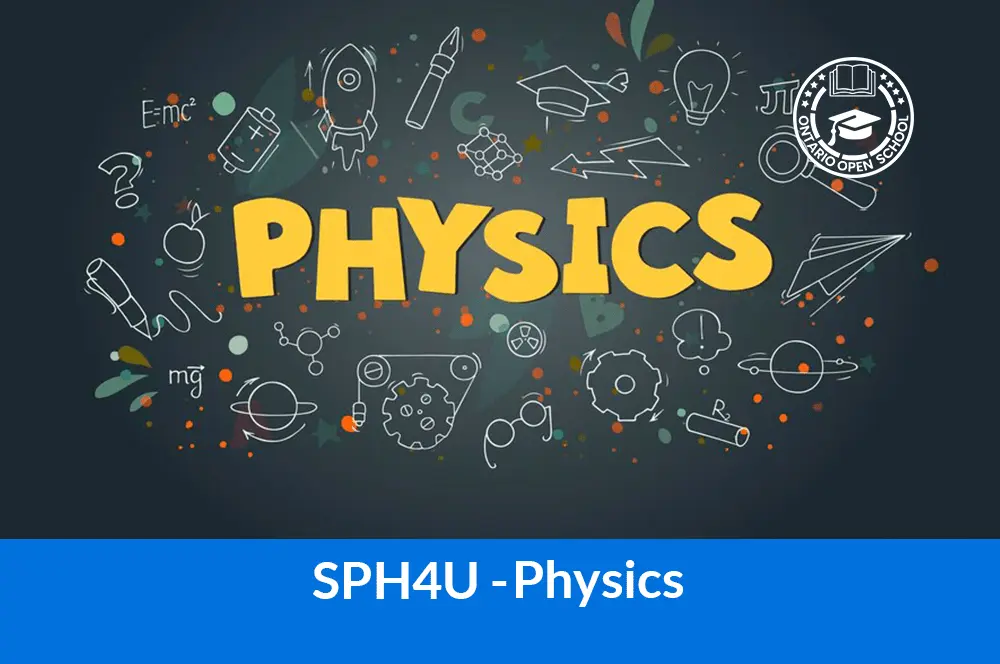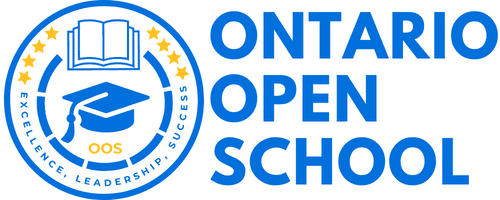- info@ontarioopenschool.com
- 647-494-4499
-
Unit 100 - 29 Gervais Drive, North York, ON.
M3C 1Y9
Copyright 2024 Ontario Open School Inc. All Rights Reserved.
This course enables students to deepen their understanding of physics concepts and theories. Students will continue their exploration of energy transformations and the forces that affect motion, and will investigate electrical, gravitational, and magnetic fields and electromagnetic radiation. Students will also explore the wave nature of light, quantum mechanics, and special relativity. They will further develop their scientific investigation skills, learning, for example, how to analyze, qualitatively and quantitatively, data related to a variety of physics concepts and principles. Students will also consider the impact of technological applications of physics on society and the environment.
Unit Order | Unit Name | Suggested Time |
|---|---|---|
| Unit 1 | Dynamics Students will review concepts essential to their success in the course: scientific notation, significant digits, vector operations, and fundamental mathematical tools. Principles of kinematics and free body diagrams will also be reviewed and extended. By the end of the unit, students will demonstrate and understanding of the forces involved in uniform circular motion and motion in a plane. They will have investigated forces involved in these modes of motion and have solved related problems. They will analyse technological devices that apply the principles of dynamics of motion, with particular respect to the effect of g-forces on the human body. | 28 hours |
| Unit 2 | Energy and Momentum Students will demonstrate an understanding of work, energy, momentum. Drawing from Grade 10 concepts of the laws of conservation of energy, they will extend these ideas to conservation of momentum in one and two dimensions. Through computer simulation and other modes of inquiry they will investigate these phenomena and solve related problems. They will conduct analyses and propose improvements to technologies and procedures that apply principles related to energy and momentum, and assess the social and environmental impact of these. | 28 hours |
| Unit 3 | Gravitational, Electric and Magnetic Fields By the end of this unit, students will demonstrate an understanding of the concepts, properties, principles and laws related to gravitational, electric and magnetic fields, particularly with respect to their interactions with matter. They will investigate these phenomena graphically and through the use of other electronic models. They will analyse the operation of technologies that use these fields and discuss the social and environmental impact of these technologies. | 24 hours |
| Unit 4 | The Wave Nature of Light Building upon concepts developed during Grade 10, students will study light with particular respect to its wave nature. Properties of waves will be discussed in a general sense, and the principles of diffraction, refraction, interference and polarization will be investigated theoretically and through simulation. Technologies that make use of the knowledge of the wave nature of light, and their social and environmental impacts, will be discussed. | 10 hours |
| Unit 5 | Revolutions in Modern Physics: Quantum Mechanics and Special Relativity In this unit, some of the most exciting and counterintuitive concepts in physics, including Einstein’s ideas about relativity, photoelectric effect, and particle physics, will be examined. Quantum mechanics and special relativity will be investigated mathematically, and related problems will be solved. In light of the revolutionary ideas studied in this unit, students will discuss how the introduction of new conceptual models can influence and change scientific thought, and lead to the development of new technologies. | 12 hours |
| Final Evaluation 30% | Final Project Final Exam | 6 hours 2 hours |
| Total | 110 Hours |
A wide variety of instructional strategies are used to provide learning opportunities to accommodate a variety of learning styles, interests and ability levels. These strategies include, but are not limited to:
| Oral Presentation | Activity Learning Centers | Carousel | Guided Exploration |
| Discussion | Think Pair Share | Lecture | |
| Socratic Lesson | Visual Stimuli | Worksheet | |
| Independent Study | Note Making | Inquiry Process | |
| Research Process | Scientific Method | Concept Map | |
| Computer Assisted Instruction | Media Presentation | Jigsaw | |
| Consequence Map | Flow Chart | Brainstorming | |
| Mind Map | Role Play | Demonstration | |
| Problem Solving | Experimenting | Reflection |
Purpose
The primary purpose of assessment is to improve student learning. Assessment relates directly to the expectations for the course.
A variety of assessments for and as learning are conducted on a regular basis to allow ample opportunities for students to improve and ultimately demonstrate their full range of learning and for the teacher to gather information to provide feedback. Assessment tasks relate to the success criteria set out in lesson plans. Success criteria allow students to see what quality looks like.
Evaluation is the process of judging the quality of student work in relation to the achievement chart categories and criteria and assigning a percentage grade to represent that quality. Evaluation is based on gathering evidence of student achievement through:
Assessment for Learning – we provide feedback and coaching. Assessment FOR Learning is the process of seeking and interpreting evidence for the use of learners and their teachers to decide where the learners are in their learning, where they need to go, and how best to go there.
Assessment as Learning – we help students monitor progress, set goals, reflect on their learning
Assessment AS Learning is the process of the explicit fostering of students’ capacity over time to be their own best assessors, but teachers need to start by presenting and modeling external, structured opportunities for students to assess themselves.
Assessment of Learning – we use assessments to provide evaluative statements about student achievement. Assessment OF Learning is the assessment that becomes public and results in statements of symbols
(marks/grades/levels of achievement) about how well students are learning. It often contributes to pivotal decisions that will affect students’ future.
ASSESSMENT TOOLS
|
|
Units | Duration | EXP. | AFL | AAL | AOL | K
25% |
A
25% |
C
25% |
T
25% |
|
70% |
A | A1-A2 |
Student – Teacher Conferencing |
Peer Assessment
Goal Setting |
Independent Project | • | • | • | • | |
| B |
33
|
B1-B3 | Assigned Questions
Performance Task |
KWL Chart | Unit Test
Poster Presentation |
• | • | • | • | |
| C |
31
|
C1-C3 | Worksheet
Diagnostic Quiz |
Reflective Discussion | Unit Test
Performance Task |
• | • | • | • | |
| D |
24
|
D1-D3 | Class Discussion
Exit Card |
Learning Log | Unit Test
Written Assignment |
• | • | • | • | |
| E | 10 | E1-E3 | HomeWork | Peer Pair Assessment | Unit Test
Collaborative Project |
• | • | • | • | |
| F | 12 | F1-F3 | Oral Presentation | KWL Chart | Unit Test
Q/A Session |
• | • | • | • | |
| 30% |
Final Exam 30% (A1-F3)
|
• | • | • | • | |||||
Resources
Grading
Weighting of categories
| Knowledge/Understanding | Thinking/Inquiry | Communication | Application |
| 25 % | 25 % | 25 % | 25 % |

Course Grade | Grade 12 |
|---|---|
Course Code | SPH4U |
Course Category | Science |
Course Type | University Preparation |
Course Delivery | Online |
Course Duration | 110h |
Course Credit | 1.00 |
Copyright 2024 Ontario Open School Inc. All Rights Reserved.
